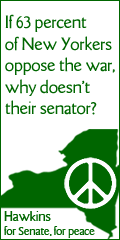|
Back
|
Whatever Happened to Public Power?
Syracuse City Eagle
By Walt Shepperd |
When Howie Hawkins announced during last year's mayoral debates that he was making public power the major plank in his Green Party platform, a quiet excitement seeped into the otherwise rhetorical series of basically polite combined appearances with incumbent Democrat Mat Driscoll and Republican challenger Joanie Mahoney.
The shift from local ownership of Niagara Mohawk to the British mega-multinational National Grid had created the image of an absentee landlord, especially when the rates skyrocketed and the concept of consumer service seemed to disappear. Hawkins' folksy portrayals of NiMo executives living in Skaneateles where public power cost them one-quarter of what Syracuse residents were paying drove home the point that city dwellers might not be totally powerless to deal with the situation. In debates, Mahoney at times agreed with him. Driscoll mused that public power was definitely an option deserving of consideration.
Given the closeness of the race Mahoney had the support of the Post-Standard and at times led in some polls with the threat of Democrats losing patronage and the command of city contracts, and the realistic possibility that Republicans could snatch them away, both parties mobilized their most strenuous get out the vote drives in years.
Way out staffed and outspent, the Greens polled little more than half the numbers their mayoral candidate Jennifer Daniels had tallied four years previous. But by articulating the public power issue, Hawkins had established a seeming instant credibility compared to the perennial campaigns he had waged for almost every office on the ballot since 1993. After a series of small meetings Hawkins organized in Southside churches, over 250 city residents gathered at Fowler High School to tell Common Councilors that public power was an issue whose time had come.
At the time, Hawkins reflected last week, the councilors all seemed down with the issue, even including a $40,000 item in the proposed city budget for a feasibility study to determine the possibility of a city-owned utility like the one in Solvay. But the Democrats on the Council decided they didn't want to look like tax and spend liberals. They were concerned about building up the reserve and getting ready for the coming deficit. They cut the feasibility study and the racial profiling study and the restoration of funding cut from the Parks and Recreation Department. It was really posturing rather than the numbers. Those three items were relatively small. Hawkins tried to mobilize a follow up to the support he had received from his raising the issue in mayoral debates, but a new challenge derailed it as a major focus. As the election returns were tallied last November, he announced he wanted to manage the campaign of a Green candidate in this fall's congressional election.
But the Green Party state committee was having none of it. They drafted Hawkins to run for the Senate seat held by Hillary Clinton. Since, unlike the Republicans and Democrats, the Greens did not have permanent ballot status, Hawkins had to put organizing for public power on the back shelf while he helped gather the 15,000 signatures on nominating petitions required to get himself, and the other statewide Green candidates, listed on this fall?s voting machines. Earlier this month the Greens delivered more than 30,000 signatures on petitions to the Elections Commission in Albany.
"I got 3,011," Hawkins noted. "When people wouldn't sign I asked them if they wanted the troops to come home. After they heard that, nine out of ten would sign." While gathering signatures, Hawkins observed, he found that most of the Democrats he talked to thought Clinton was anti-war. He plans to make her actual support for the war an issue to hammer her on, if he gets the opportunity to debate.
Although Hawkins has issued a challenge to Clinton, who faces a Democratic primary against anti-war candidate Jonathan Tasini, to debate anywhere, any time, he figures she will risk the potential criticism from refusing to debate rather than risk getting torn up in public on the war and other issues. He has already appeared at a forum with an empty chair emphasizing Clinton's absence, and said the Greens have a chicken suit for dogging her at campaign stops.
Beside an immediate end to the War in Iraq, he said he would campaign for national health insurance. "The idea had 100 cosponsors in Congress and 70 percent public support in the polls in 1993 when Clinton swept it off the table with her Hillarycare, compulsory private insurance, which as a 30 percent overhead compared to a public single payer, where the overhead is 3 percent. It worked. She is now the top recipient among Senators in health insurance companies' campaign contributions."
The third plank in Hawkins' platform is an extension of his quest for public power, which rather than statewide concern is a municipal issue. "I would take $300 billion from the military," the former Marine maintained, "to establish a global public works program to build a new energy infrastructure around renewable energy sources, for jobs, peace, and the environment. It would create untold jobs to retrofit buildings, industries, and public infrastructures. I would create a national oil company to stabilize gas prices and enable the transition. It would foster peace because rather than waging wars for oil and occupying countries, spreading resentment, we would be spreading good energy and good will. It would do more for national security than the strongest military force in the world."
|
| |
 *Website by David Doonan, Labor Donated to Hawkins for Senate Campaign* *Website by David Doonan, Labor Donated to Hawkins for Senate Campaign* |
|
|


